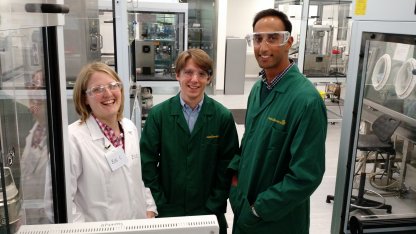August 27, 2015, by Editor
Completion of the Centre for Doctoral Training in Targeted Therapeutics
Ten years ago, the University of Nottingham’s School of Pharmacy embarked on a new adventure in pharmaceutical sciences with the creation of a Centre for Doctoral Training in Targeted Therapeutics. Funded by the Engineering and Physical Sciences Research Council (EPSRC) and AstraZeneca, it was the first CDT to be established in direct collaboration with an industry partner.
On 3rd September the CDT will be holding a celebratory colloquium to mark the successful completion of the original programme. It will be an opportunity for current and former CDT staff, students, and alumni, as well as AstraZeneca scientists and members of the CDT Advisory Board, to celebrate the many achievements of the CDT and its students since it was founded in 2005. Reflecting on the CDT’s accomplishments Professor Cameron Alexander, the CDT’s Director, has said that it “has been an enormous success and a fantastic endeavour in which to be involved.”
Professor Alexander added that “The sustained funding from EPSRC and AstraZeneca has allowed us to develop 30 new research projects, build collaborations linking over 60 scientists from Nottingham and AstraZeneca, and train 6 cohorts of PhDs who are now developing leadership roles in industry and universities with reach across the world. Projects in the CDT have pioneered new ideas which could really change future healthcare. The concept of 3D printed tablets was first explored in the CDT back in 2006, well before 3D printing became mainstream, and a recent project has revealed a mechanism by which the bacteria H. pylori, attaches to stomach cells, which could provide an entirely new basis for anti-bacterial and other drugs.”

Dr Zoe Cotter, Dr Andrew Megarry and Dr Arpan Desai now working as Senior Scientists for AstraZeneca in Macclesfield
The colloquium will include talks from Dr Victoria Marlow (EPSRC), Dr Mark Purdie (AstraZeneca), and Professor Bill Dawson, chair of the CDT Advisory Board, as well as CDT alumni discussing the different trajectories their careers have taken since finishing their PhDs.
Commenting on the success of the CDT in Targeted Therapeutics, Professor Dawson noted “that there will be a continuing need for these training programmes and if you have the opportunity to support or participate in the future please do so and I hope you will have as much pleasure as I have had from my interaction here.”
Dr Purdie added that “The collaboration [between AstraZeneca and the University of Nottingham] has strengthened our relationship with a leading School of Pharmacy within the UK and delivered projects that have been applied to our drug development projects.”
The success of the CDT in Targeted Therapeutics is reflected in the fact that in 2012 it was expanded to form the CDT in Targeted Therapeutics and Formulation Sciences as the University of Nottingham and AstraZeneca were joined in partnership by the School of Pharmacy at University College London (UCL) and five additional industry partners: Alliance Boots, Pfizer, GlaxoSmithKline, Quotient Clinical, and Molecular Profiles.
Following on from here the CDT in Advanced Therapeutics and Nanomedicines was launched in October 2014 in partnership with the EPSRC, Alliance Boots, AstraZeneca, GlaxoSmithKline, and Pfizer. As we celebrate the completion of the CDT in Targeted Therapeutics, like Dr Purdie, we too “look forward to building upon the success of the original CDT as it evolves into the new CDT in Advanced Therapeutics and Nanomedicines involving UCL and other leading pharmaceutical companies.”
Professor Cameron Alexander, Director of the Centre for Doctoral Training


Therapeutics accordingly refers to the use of drugs and the method of their administration in the treatment of disease. This project has got through several years and it finally succeed. It is believed that it can be applied to many areas.